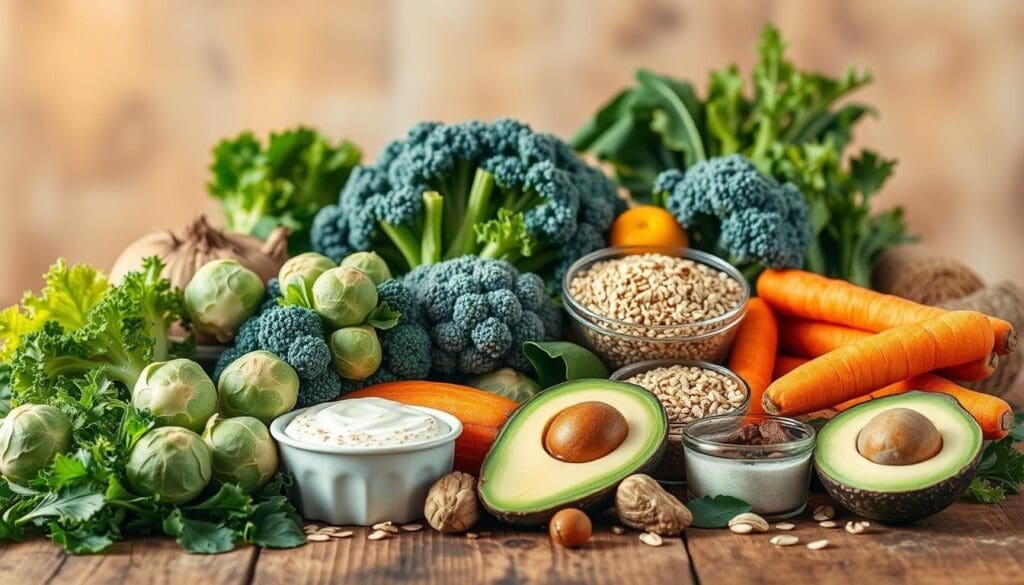
Keeping your colon healthy is key for good digestion and avoiding colon diseases. Studies prove that eating certain foods can greatly help your colon health.
A healthy gut microbiome is vital for a good digestive system. Thebest food for colon help your gut bacteria grow well. This supports your overall health.
Adding the right foods to your diet can help your colon health a lot. In this article, we’ll look at the top foods for a healthy colon and better digestion.
Key Takeaways
- Eating the right foods can help prevent colorectal diseases.
- A balanced diet supports a healthy gut microbiome.
- Certain foods can help maintain a healthy colon.
- A well-functioning colon is essential for overall digestive wellness.
- Incorporating colon-friendly foods into your diet can promote better digestion.
The Importance of Colon Health and Digestive Wellness

Colon health is closely tied to our digestive wellness. It affects how our body breaks down food and absorbs nutrients. A healthy colon is key to our well-being, helping us absorb nutrients and remove waste.
Understanding the Role of Your Colon in Digestive Health
The colon, or large intestine, is a vital part of our digestive system. It absorbs water and electrolytes from waste, concentrating it for elimination. A healthy colon is essential for proper digestion and overall health.
- Absorbs water and electrolytes
- Stores and eliminates waste
- Supports the immune system through the gut-associated lymphoid tissue (GALT)
Common Colon Issues and Their Impact on Overall Health
Many issues can affect the colon, from mild to severe. Some common problems include:
- Constipation: Difficulty in passing stools or infrequent bowel movements.
- Diverticulitis: Inflammation of the diverticula, which are small pouches in the colon wall.
- Colon cancer: Abnormal cell growth in the colon that can become malignant.
These conditions can greatly affect our health, causing discomfort and pain. They can also lead to serious complications if not treated.
“A healthy gut microbiome is essential for a strong immune system and overall well-being.” – A Gastroenterologist
How Diet Influences Colon Function
Diet is very important for colon health. A diet rich in fiber helps keep the colon clean by promoting regular bowel movements. Foods like high-fiber fruits, leafy greens, whole grains, and legumes are good for the colon.
Eating a balanced diet with these foods supports colon function and digestive wellness. Drinking plenty of water is also key to staying hydrated.
Why Diet Matters: The Connection Between Food and Colon Health

Diet and colon health are closely linked. What we eat affects our colon’s health, a key part of our digestive system.
A healthy colon is vital for nutrient absorption and waste elimination. A diet rich in fiber, fruits, and vegetables supports colon health. Without these, colon issues can arise.
The Science Behind Digestive Health
Digestive health involves breaking down food, absorbing nutrients, and eliminating waste. The colon is key in this process, holding waste until it’s eliminated.
The gut microbiome, with trillions of microorganisms, is vital for fermentation and vitamin production. A balanced diet supports a healthy gut microbiome, which aids colon health.
- A diet high in fiber promotes beneficial bacteria growth.
- Drinking enough water prevents constipation by softening stool.
- Staying away from processed foods reduces harmful additives intake.
How Proper Nutrition Supports Colon Function
Proper nutrition is essential for colon function. Nutrients like fiber, vitamins, and minerals are critical for colon health.
Fiber is key for regular bowel movements and preventing constipation. It also supports beneficial gut bacteria. Foods high in fiber include fruits, vegetables, whole grains, and legumes.
- Add a variety of fruits and vegetables to your diet.
- Choose whole grains over refined ones.
- Legumes and beans are great for protein and fiber.
Risk Factors for Colorectal Issues
Diet is just one factor in colon health. Other factors like family history, age, and physical activity level also play a role.
A diet rich in red and processed meats, low in fiber, and high in alcohol increases colorectal cancer risk. Knowing these risk factors helps make better choices to lower risk.
| Risk Factor | Description |
| Family History | A history of colorectal cancer in first-degree relatives. |
| Age | Risk increases significantly after the age of 50. |
| Physical Inactivity | Lack of regular physical activity. |
High-Fiber Fruits: Nature’s Colon Cleansers
Nature has given us many high-fiber fruits that help clean our colon. These fruits are tasty and full of nutrients and fiber. They are key to a healthy colon diet.
Apples: Pectin-Rich Digestive Support
Apples stand out for their pectin, a soluble fiber. Pectin helps with bowel movements and supports good gut bacteria. Eating apples daily boosts digestive health.
Berries: Antioxidant and Fiber Powerhouses
Berries like strawberries, blueberries, and raspberries are full of antioxidants and fiber. Their fiber and antioxidants support colon health and digestion. Eating different berries keeps gut bacteria balanced.
Pears and Other Fibrous Fruits
Pears are also high in fiber, making them natural colon cleansers. They have both soluble and insoluble fiber, aiding regular bowel movements and preventing constipation. Other fruits like peaches and plums also help keep the colon healthy.
| Fruit | Fiber Content (per 100g) | Benefits |
| Apples | 2.4g | Rich in pectin, supports digestive health |
| Berries (avg.) | 3.5g | High in antioxidants and fiber |
| Pears | 3.1g | Promotes regular bowel movements |
Adding these high-fiber fruits to your diet can greatly improve colon health. Simple changes in your fruit choices can help your digestive system and overall health.
Leafy Greens and Cruciferous Vegetables for Colon Protection
Leafy greens and cruciferous vegetables are great for your colon. They are full of fiber, vitamins, and minerals. These nutrients help with digestion and keep your gut healthy.
Kale, Spinach, and Other Leafy Greens
Kale and spinach are full of nutrients good for your colon. They have lots of fiber, which helps your bowels move smoothly. They also have antioxidants and other compounds that fight inflammation in your digestive system.
Nutritional Benefits of Leafy Greens:
- High in dietary fiber
- Rich in vitamins A, C, and K
- Contain minerals like calcium and iron
- Antioxidant properties
Broccoli, Cauliflower, and Brussels Sprouts
Broccoli, cauliflower, and Brussels sprouts are good for fighting cancer and keeping your colon healthy. They have sulforaphane, which is anti-inflammatory and anti-cancer.
Benefits of Cruciferous Vegetables:
| Vegetable | Nutritional Benefits |
| Broccoli | Rich in vitamin C, fiber, and sulforaphane |
| Cauliflower | High in vitamin K, folate, and fiber |
| Brussels Sprouts | Packed with vitamin C, fiber, and antioxidants |
How Cruciferous Vegetables Fight Inflammation
Cruciferous vegetables can lower inflammation in your body. This is important for keeping your colon healthy. The sulforaphane in these veggies helps protect against oxidative stress and inflammation.
“The consumption of cruciferous vegetables has been associated with a reduced risk of colorectal cancer, highlighting their importance in a colon-healthy diet.”
Eating leafy greens and cruciferous vegetables can greatly improve your colon health. It can also lower the risk of colon problems.
Whole Grains: Sustainable Energy for Digestive Health
Whole grains are key for a healthy diet. They boost digestive health and give you lasting energy. They’re packed with fiber, antioxidants, and nutrients that help good gut bacteria grow.
Oats and Barley: Soluble Fiber Champions
Oats and barley stand out for their soluble fiber. Soluble fiber slows digestion, helping your body absorb nutrients better. It also keeps you feeling full, which is good for blood sugar and weight control.
These grains also have beta-glucans. They’re good for your heart by lowering cholesterol.
Brown Rice and Quinoa: Complete Nutrition
Brown rice and quinoa are whole grains with complete nutrition. Quinoa is a complete protein, with all nine essential amino acids. It’s great for boosting protein without losing whole grains.
Brown rice is full of manganese. This mineral is important for body functions and fighting off free radicals.
Whole Wheat and Ancient Grains
Whole wheat and ancient grains like Kamut and spelt are also good. They’re full of fiber, vitamins, and minerals. Ancient grains are less processed, keeping more nutrients.
Eating a variety of whole grains is important. It ensures you get lots of nutrients. This variety is essential for your overall health, including your colon.
Legumes and Beans: The Best Food for Colon Health
Legumes and beans are full of nutrients that help your colon stay healthy. They are rich in protein, fiber, and vitamins and minerals. These nutrients are key for a healthy digestive system.
Lentils: Protein and Fiber Combination
Lentils stand out because they have a lot of protein and fiber. This mix is great for your colon because it helps with bowel movements. It also supports good gut bacteria. Eating lentils can make your digestion better and lower the risk of colon problems.
Black Beans and Kidney Beans
Black beans and kidney beans are also good for your colon. They have lots of fiber, which helps with digestion and prevents constipation. They also have antioxidants and other nutrients that help your gut. These beans are easy to add to many dishes, like salads or main courses.
Chickpeas and Their Prebiotic Benefits
Chickpeas are known for their prebiotic benefits. Prebiotics feed the good bacteria in your gut. A healthy gut is important for your colon and digestion. Chickpeas can be enjoyed in hummus, salads, or as a snack. They’re a tasty way to support your colon health.
Eating different types of legumes and beans can really boost your colon health. These foods give you important nutrients and help your gut microbiome. This leads to better digestion and overall health.
Nuts and Seeds: Small Packages with Big Benefits
Nuts and seeds are tiny but mighty for colon health. They are full of healthy fats, fiber, and antioxidants. This makes them a great choice for a diet that’s good for your colon.
Flaxseeds and Chia Seeds: Omega-3 Powerhouses
Flaxseeds and chia seeds are great for your colon because of their omega-3s and fiber. These help fight inflammation and keep your bowels regular. You can easily add them to your cereal or yogurt.
Walnuts, Almonds, and Other Beneficial Nuts
Walnuts, almonds, and other nuts are tasty and good for your colon. They’re full of fiber and antioxidants. Eating a small handful of nuts each day is a healthy choice.
Proper Consumption for Maximum Benefits
To get the most from nuts and seeds, eat them right. Soaking them can make their nutrients better. But, don’t eat too much because it can add too many calories.
Adding different nuts and seeds to your meals can give you lots of nutrients. This helps keep your colon and digestive system healthy.
Fermented Foods: Probiotic Support for Gut Microbiome
Probiotics are key for a healthy gut. Fermented foods are a natural way to add them to our diet. For centuries, people have eaten fermented foods for taste and health. Fermentation uses bacteria and yeast to break down sugars and preserve food, creating probiotics.
Yogurt and Kefir: Dairy Probiotics
Yogurt and kefir are famous for their probiotics. Yogurt has Lactobacillus bulgaricus and Streptococcus thermophilus, aiding digestion and immunity. Kefir has more probiotics and yeast, making it great for gut health.
Kimchi, Sauerkraut, and Fermented Vegetables
Fermented veggies like kimchi and sauerkraut add flavor and probiotics. Kimchi is a Korean dish with fermented cabbage and spices. It’s full of good bacteria for the gut. Sauerkraut is fermented cabbage, rich in probiotics and vitamins.
Kombucha and Other Fermented Beverages
Kombucha is a fermented tea drink loved for its health perks. It’s made with a SCOBY that ferments the tea, creating a fizzy drink full of probiotics and antioxidants. Other fermented drinks like kefir water and fruit juices also offer probiotic benefits.
Lean Proteins: Building Blocks for Colon Tissue Health
Lean proteins are key for colon health. They help repair tissue and keep digestion running smoothly. Eating lean proteins keeps your colon healthy, which helps prevent digestive problems.
Fish Rich in Omega-3 Fatty Acids
Fish like salmon and sardines are great for colon health. They’re full of omega-3 fatty acids. These fats fight inflammation in the colon, making digestion better.
Nutritional Benefits of Omega-3 Rich Fish:
| Fish Type | Omega-3 Content | Health Benefits |
| Salmon | High | Reduces inflammation, supports heart health |
| Sardines | High | Rich in calcium, supports bone health |
| Mackerel | High | Supports brain health, reduces triglycerides |
Poultry and Plant-Based Protein Options
Poultry and plant-based proteins are also good for your colon. Chicken and turkey are lean and full of amino acids. Lentils, chickpeas, and tofu are high in protein and fiber, which is great for your colon.
A gastroenterology expert says, “Eating lean proteins and fiber can lower colon disease risk.” Mixing different protein sources in your diet is important for getting all the nutrients your colon needs.
“A diet rich in lean proteins and fiber can significantly reduce the risk of colon-related issues.” – Gastroenterology Expert
Balancing Protein in a Colon-Healthy Diet
It’s important to balance your protein intake for colon health. Eating a variety of proteins ensures you get all the nutrients. Adjust your protein intake based on your age, activity level, and health.
In short, lean proteins are essential for colon health. A diet that includes fish, poultry, and plant-based proteins supports digestion. Making sure you get enough protein while eating a balanced diet is key to a healthy colon.
Hydration and Colon-Friendly Beverages
Hydration is key for a healthy colon and digestion. Drinking enough water helps prevent constipation by making stool softer. It also helps nutrients get absorbed and keeps the colon’s lining healthy.
Water: The Ultimate Colon Cleanser
Water is vital for keeping the colon clean by removing toxins. Drinking enough water is important to avoid constipation and lower colon disorder risks. Try to drink at least eight glasses of water daily for your colon’s health.
Herbal Teas and Their Digestive Benefits
Some herbal teas offer extra benefits for the colon. Herbal teas like peppermint, chamomile, and ginger have anti-inflammatory effects. They can calm the digestive system and support a healthy gut. These teas also help with IBS symptoms.
| Herbal Tea | Benefits for Colon Health |
| Peppermint Tea | Relieves IBS symptoms, reduces inflammation |
| Chamomile Tea | Soothes digestive tract, promotes relaxation |
| Ginger Tea | Aids digestion, reduces nausea and inflammation |
Beverages to Avoid for Colon Health
Some drinks are good for the colon, but others are not. Sugary drinks, caffeinated beverages, and alcohol can dry out the body and upset the colon. Cutting down on these can help keep your colon healthy.
Creating a Balanced Colon-Healthy Eating Plan
To keep your colon healthy, it’s important to eat a balanced diet. Focus on foods that are good for your colon. Include lots of fiber, fruits, vegetables, and whole grains in your meals.
Daily Nutritional Guidelines for Optimal Colon Health
Eat a variety of foods to get all the nutrients you need. Here are some daily tips:
- Fiber intake: Aim for 25-30 grams a day from fruits, veggies, and whole grains.
- Fruit and vegetable servings: Have at least 5 servings a day, with a mix of dark greens and colorful veggies.
- Whole grains: Add brown rice, quinoa, and whole wheat to your meals.
- Hydration: Drink 8 glasses of water a day to help fiber move through your system.
Meal Planning Strategies
Good meal planning is key to a healthy diet. Here are some tips to help:
- Plan your meals around: Use seasonal produce for freshness and variety.
- Incorporate leftovers: It saves time and reduces waste.
- Prep in advance: Chop veggies and cook grains early to speed up meal prep.
- Balance your plate: Make sure each meal has protein, healthy fats, and complex carbs.
Transitioning to a Colon-Friendly Diet
Switching to a colon-friendly diet can be tough, but it’s doable. Start by:
- Increasing fiber intake gradually: Let your gut adjust slowly.
- Introducing new foods slowly: Watch how your body reacts and avoid discomfort.
- Replacing processed foods with whole foods: This boosts nutrition and supports your colon.
By following these tips, you can make a diet plan that’s good for your colon and overall health.
Conclusion: Nourishing Your Colon for Lifelong Health
Keeping your colon healthy is key to staying well overall and avoiding colon diseases. A healthy colon is vital for good digestion. Eating foods rich in fiber, vitamins, and minerals helps a lot.
Eating the right foods for your colon is important. Include fruits, greens, whole grains, legumes, and fermented foods. These foods help your gut stay healthy and support your health for life. Making smart food choices and drinking plenty of water can lower colon disease risks.
Looking after your colon is a smart choice for your health. It leads to better digestion, a stronger immune system, and less chance of chronic diseases. Start taking care of your colon today for a healthier digestive system in the future.
FAQ
What are the best foods for colon health?
Good foods for your colon include apples, berries, and pears. Also, eat leafy greens like kale and broccoli. Whole grains like oats and quinoa are great too. Don’t forget legumes, nuts, and seeds, and fermented foods like yogurt and sauerkraut.
How does diet influence colon function?
Your diet is key to a healthy colon. It gives you the nutrients, fiber, and probiotics your gut needs. These help with regular bowel movements and reduce inflammation.
What are some colon-friendly beverages?
Drink water, herbal teas like peppermint and chamomile, and fermented drinks like kombucha. Avoid sugary, caffeinated, and carbonated drinks that can upset your colon.
How can I create a colon-healthy eating plan?
Eat a variety of whole foods like fruits, veggies, whole grains, legumes, and lean proteins. Include fiber and probiotics in every meal. Drink lots of water all day.
What are some risk factors for colorectal issues?
Risks include a diet low in fiber and high in processed foods, not being active, smoking, and family history. Eating right and staying active can help lower these risks.
How do fermented foods support colon health?
Fermented foods give you probiotics. These help your gut bacteria grow, boost your immune system, and reduce inflammation.
What are some benefits of high-fiber fruits for colon health?
Fruits like apples, berries, and pears help your colon by promoting regular bowel movements. They also reduce inflammation and protect cells from damage.
How do leafy greens and cruciferous vegetables support colon health?
These veggies are packed with fiber, vitamins, and minerals. They help with digestion, reduce inflammation, and protect cells.
What is the role of hydration in colon health?
Drinking enough water is vital for colon health. It prevents constipation, lowers colon cancer risk, and keeps your digestive system healthy.
How can I transition to a colon-friendly diet?
Start by adding more whole foods to your meals. Increase your fiber intake slowly. Drink plenty of water. Meal planning can help make the transition easier.
What are some colon cleanse foods?
Colon cleanse foods include high-fiber fruits and veggies, fermented foods, and probiotic-rich foods like yogurt and kefir. These foods help with regular bowel movements and support good gut bacteria.
References
- Vallis, J. (2022). The role of diet and lifestyle in colorectal cancer prevention. Nutrition and Cancer, 74(5), 1197–1205. https://www.ncbi.nlm.nih.gov/books/NBK585999/




































